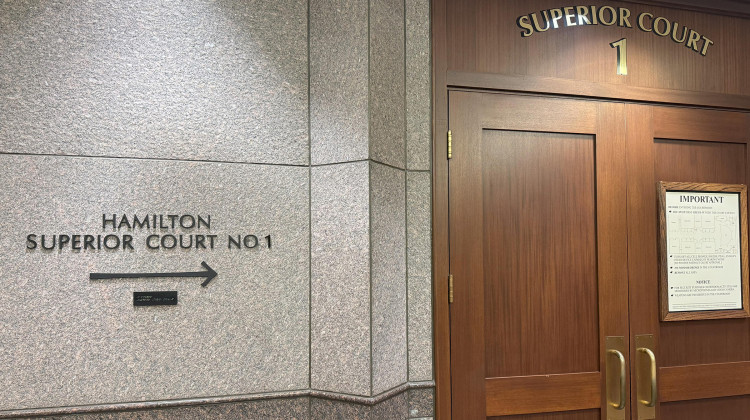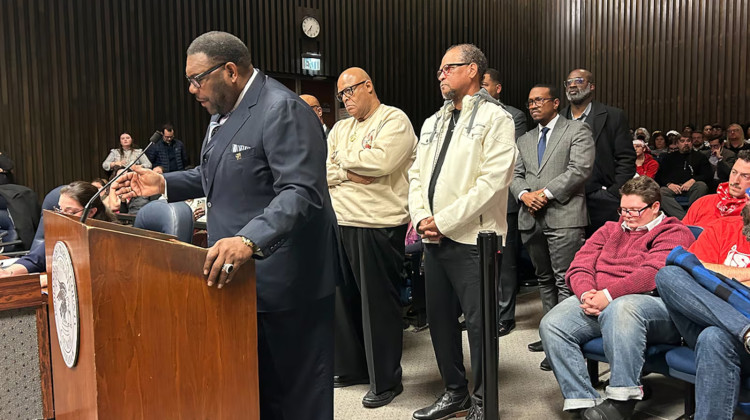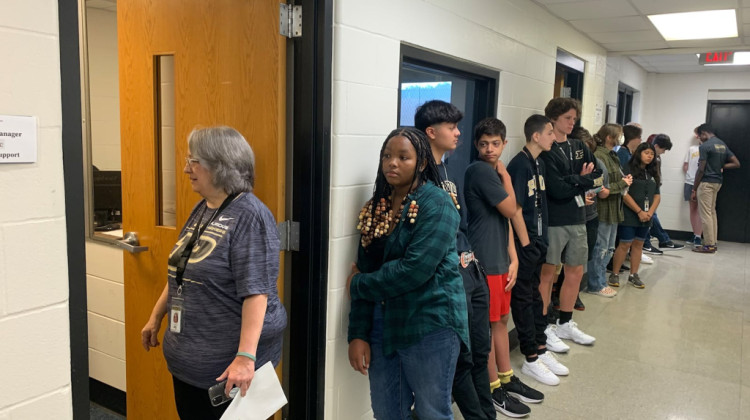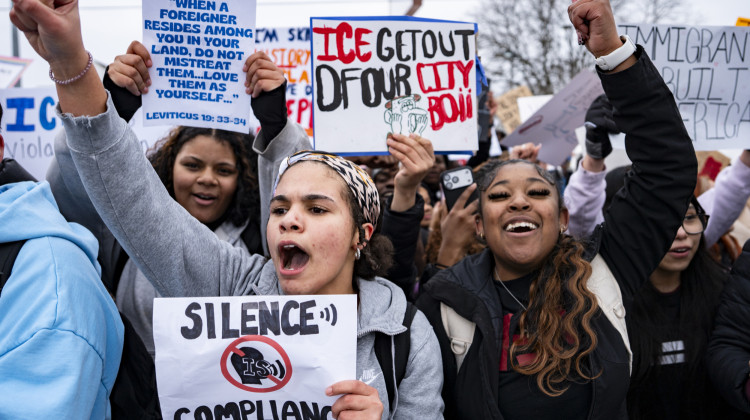
Indiana Virtual School founder Thomas Stoughton and his wife Rhonda Stoughton were scheduled for a hearing in Hamilton County Superior Court on Tuesday, Nov. 12, 20024. But it was delayed until January.
Dylan Peers McCoy / WFYIThe founder of a defunct Indiana online charter school and his wife were in court Tuesday after the state alleges they improperly mortgaged a $2.6 million Florida condo, which they were then forced to sell because of a foreclosure.
The Florida sale is one of several developments that raise concerns that Indiana will be unable to recoup much of the money lost in an alleged enrollment fraud.
In a related criminal case, Indiana Virtual School founder Thomas Stoughton’s defense attorney told the court he has not been fully paid. And Thomas and his wife Rhonda Stoughton are more than $18,000 behind on the taxes for their Carmel home.
Indiana is suing the Stoughtons, along with several other parties, in a bid to recoup over $154 million the state paid to Indiana Virtual School and Indiana Virtual Pathways Academy. The schools are accused of falsely inflating school enrollment to increase state funding and paying millions of dollars to companies with ties to school officials or their family members.
The Hamilton County Superior Court was expected to hold a hearing Tuesday on whether the Stoughtons had violated an agreement designed to preserve their assets. But the Office of the Indiana Attorney General agreed to delay the hearing until January. The Stoughton’s must deposit about $237,000 from the sale of the Florida property with the court.
When approached by a WFYI reporter Tuesday, Thomas Stoughton declined to comment on either case, and Rhonda Stoughton was silent.
As spokesperson for the Office of Attorney General Todd Rokita said in a statement that they hope to recover any money that was misappropriated for personal gain.
“We do not know whether the defendants, and there are many of them, will be able to pay the damages and restitution. What we do know, however, is that we remain committed to fighting to recoup the misappropriated money and are continuing to pursue our case,” the office wrote in a statement. “Our hope would be that we can recover any sums that were wrongly misappropriated for personal gain instead of used for educating our young Hoosiers.”
Rotating attorneys
The Stoughtons were represented by Jeffrey Heinzmann, who they hired at the last minute. Their prior attorneys in the state civil case withdrew in June, citing a “breakdown of the attorney-client relationship.”
Thomas Stoughton is currently without an attorney in the federal criminal case over the alleged fraud. Earlier this month, the court allowed attorney James Voyles to withdraw from that case because Stoughton had not fully paid his legal bills, according to court filings.
In his motion to withdraw, Voyles told the court that he began representing Stoughton in early 2024. Over the next several months, Stoughton repeatedly said he would pay fees but did not follow through.
After Voyles told the court in July he wished to withdraw, Stoughton delivered three checks to the attorney, according to Voyles. The attorney cashed one of the checks, for about a third of the money owed. But the other two checks were returned because the accounts had insufficient funds.
Florida condo foreclosure
As part of the civil litigation, the Stoughtons agreed in July 2022 not to spend more than $20,000 per month. They also agreed not to transfer, sell, or take out any loans or other encumbrances against their property without consulting the court.
The state said that over the next two years, the Stoughton’s repeatedly violated that agreement, which is enforceable by the court. Most of those violations were in connection with a condo in Longboat Key, Florida that the Stoughtons bought in 2016. In 2023, the Stoughtons paid off a mortgage on the property, and secured a new, larger loan against the condo.
The Stoughton’s stopped making the interest-only payments on the new loan in March 2024, according to the lender. And in September, a Florida court ordered a foreclosure sale on the property. The Stoughton’s sold it for $2.6 million. Most of the proceeds of the sale were used to pay off the mortgage.
Contempt allegations
The state alleges all those actions were violations of the Stoughton’s agreement.
“Without intervention and the coercive powers of this Court, there is little chance that the Stoughtons will come into compliance with the 2022 Order,” the state wrote in its motion seeking a contempt ruling. “Further, Plaintiff and this Court will remain uninformed as to the status of assets and funds currently and formerly in the possession and/or control of the Stoughtons.”
The state’s lawsuit is based on the findings from an investigation released by the State Board of Accounts in 2020. The review found that the two schools reported thousands more students than actually attended classes. As a result, they inappropriately collected more than $68 million in state funds.
The schools also paid more than $85 million in public funds to companies that had links to school officials and their family members, the audit found.
In January, a federal grand jury indicted Thomas Stoughton and two other former administrators. They are accused of a conspiracy to defraud the state by falsely reporting thousands of students who did not attend as enrolled at Indiana Virtual School and Indiana Virtual Pathways Academy.
Contact WFYI education reporter Dylan Peers McCoy at dmccoy@wfyi.org.
 DONATE
DONATE






 Support WFYI. We can't do it without you.
Support WFYI. We can't do it without you.